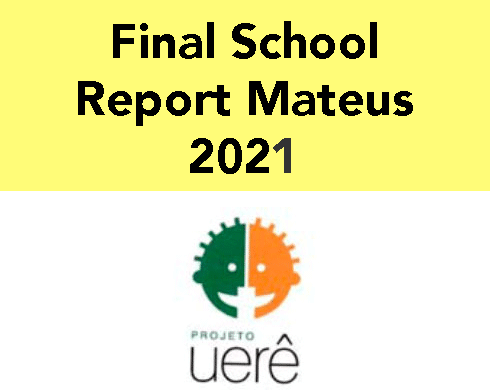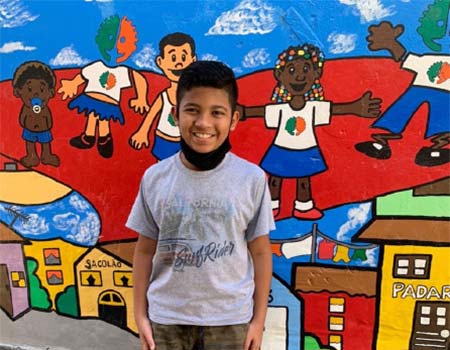Annual Report 2021
(Excerpt: For the complete report please write to Epona-Stiftung für Pferd und Umwelt c/o Mermagen, Kesselstr. 15, 53797 Lohmar)
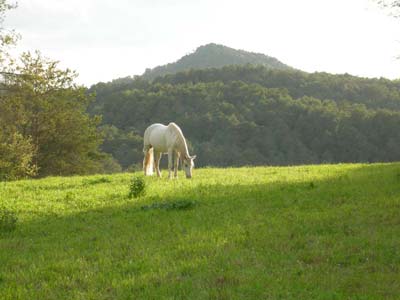
This year there were no major activities, changes, trips or visits. The daily work for the horses fills the days.
The little family
Jumpy still lives with his Equines Cushing-Syndrome (ECS). After he had been taking the hormone drug with the active ingredient pergolide for years, which didn't bring any real improvement and instead took away his appetite, we slowly discontinued the drug. After that, Jumpy wanted to eat again and we didn't notice any deterioration in his condition. Above all, Jumpy has so far been spared from laminitis, which often occurs with ECS. During the moulting period we help him with extensive brushing. He loves that, and he even endures the critical zones, such as the croup and hind legs. After all these years of caring and nurturing, Jumpy has learned that we only want the best for him.
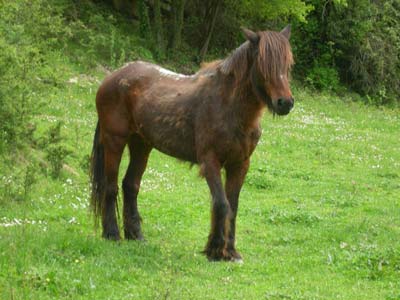
We still have to convince Kosmos of this, although less and less often, but if he doesn't want to, then there is no way to clean or treat his eyes. The treatments were rather rare in 2021 because, thank God, he no longer had any significant injuries. He knows the terrain on which he has been standing since the summer of 2020 inside out, if not almost blindly. We don't know whether he can still see with his sore eyes, but we suspect that he can still distinguish between light and shadow because he moves his head accordingly. In the early evening or morning when he has his 'crazy minutes' he trots head held high across the pastures and his past as a trotting racehorse, often spectacularly outperforming the competition, is on display for all to see.
Valentina, on the other hand, is finding it increasingly difficult to move, and she complains of pain more and more often. After the veterinarian Jordi Grau took X-rays, we found out the cause: because she relieves her so-called bad side, Jordi suspects an old injury of the sacroiliac joint, the good side is too much strain and is now also affected, the bone has one Fissure. We try to keep her pain-free with medication, because there is not much else possible. Of course, Craneo-Sacral specialist Silvia Marti Korff also comes and treats Valentina, but the results are not always as desired and hoped for.
Indhu did not have to have a tooth extracted in 2021. With the remaining ones she plucks fresh greens and enjoys her concentrated feed. Depending on the season, she gets more or less of it. She is good looking and an adorable little horse, always looking for something to eat. If she notices that we haven't come to feed her, she turns away, then no, but maybe next time, she seems to think. She is content and obviously grateful that she no longer has to haul the heavily laden cart to the Essaouira market in Morocco.
Her daughter Aloha certainly broke the abscess record this year. As soon as she assumes a certain position and makes the corresponding face, Merce comes running with the diaper, the vinegar and the tape, because the diaper-soaked vinegar bandage is still the best cure for abscesses. Apart from that, she feels comfortable on the big pastures, especially when they are dry. She is often with Valentina and even with her mother Indhu as well. Her hooves have not gotten any worse, but as always they are sensitive, especially when it is wet.
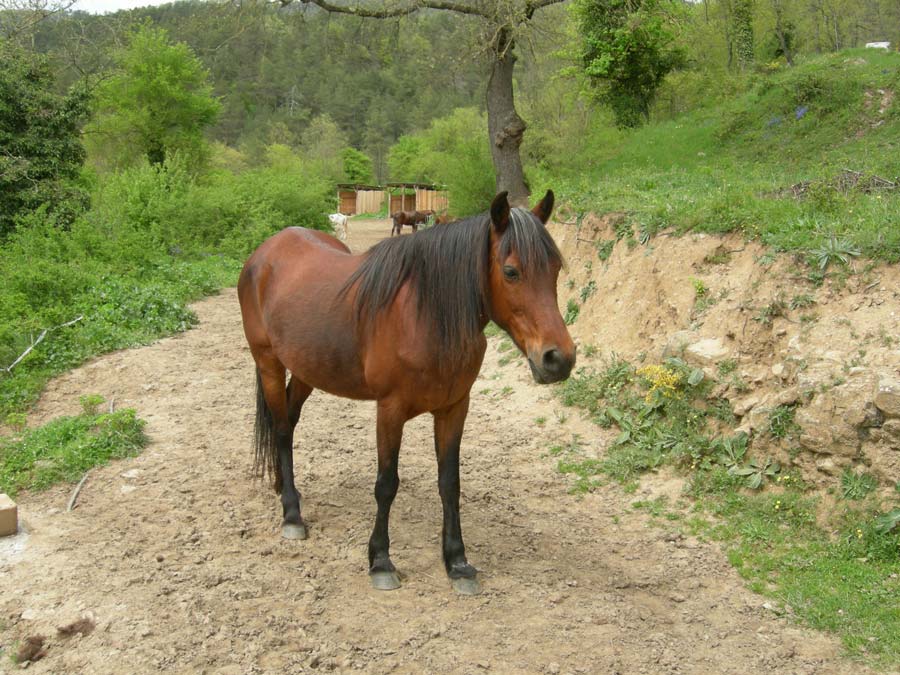
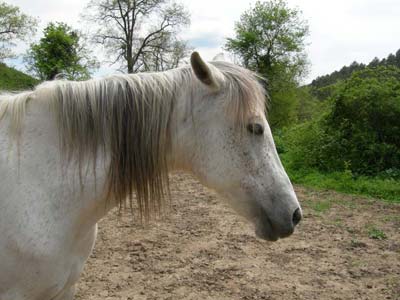
The small Epona tribe family may have many ailments, but they also show how, despite these ailments, life can be beautiful and worth living. Not much is needed for this: the friends, space, a bit of food and fresh water. The creek that runs through the pastures in St. Juan is fed by a spring that has never dried up. The horses almost always find something to eat in the pastures, and if not they get good hay from the Pyrenees. In spring and autumn, the friends do intensive grooming with each other, scratching and nibbling. "It takes little to be happy, and he who is happy is king," they teach us every day, and whisper much more about life when we can spend time with them and listen.
The mare's shamrock
Our four "newcomers" (see also the annual report 2020) are still happy and enjoy being together on the extensive pastures with forest and stream .
Freya, the gray mare and mother of Triana and eldest of the shamrocks, has lost much of her fear. She still doesn't like cows, but since they are everywhere and their bells are always unmistakable, she had no choice but to put up with it. We have taken many walks with her and spent a lot of time with her to gain her trust. Now she even comes up to us sometimes. Before, it always went in the opposite direction. Thank you Freya for your trust, we'll do our best not to disappoint.
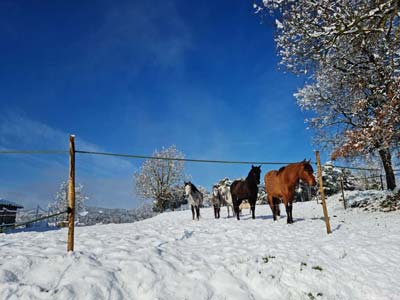
Lara, the small, brown, smart dam mare is still announcing where things are headed. For example, if the hoof carer is waiting for his "clients" at the entrance to the pastures, we only need to take Lara there and her daughter Titia, Freya and Triana will follow in "single file". If a new bale of hay is brought in with the tractor, Lara only has to be guided to the side and the area is already free. Awesome Lara, you're a great help.
Our two youngsters Titia and Triana learned this year that the world doesn't end at the electric fence. Toni Arnal comes twice a week and we take them for walks, play games and do exercises such as standing tied up. In the meantime they have got to know the sheep and goats and of course the cows. Hay silage wrapped in plastic is no longer a monster, any more than tractors or trucks are. They are now also familiar with the village, the asphalt, the manhole covers, chainsaws and the screaming of the school children. They go through ditches and water without any problems. Fear has given way to curiosity and trust.
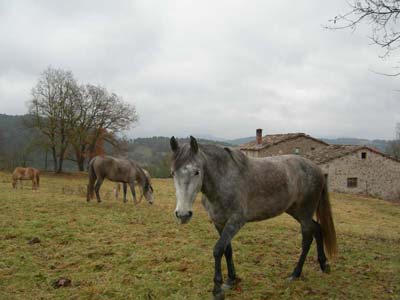
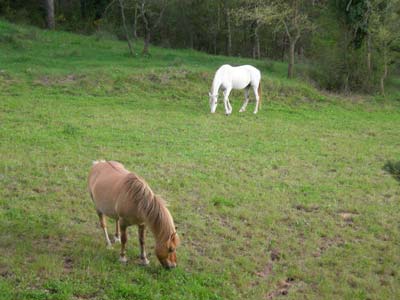
For several months we tried to bring the four mares together with the Epona lineage. But that didn't work. The mares, all much younger than our "oldies" and above all with the bold Lara in the lead, pushed Kosmos and Co. from the hay. They made themselves so spread out in the shelters that the others always stood in the rain. The biggest problem was the hay. The easy-feeding Spanish mares need almost no hay, they should learn to forage, because there is more than enough for them on the pastures. Far too much hay has been thrown into their boxes for long enough. When they came to Merce they were fat, muscleless and didn't really know what to do with a pasture. Slowly they learned that good food grows in pastures. But as soon as they saw a bale of hay, they pounced on it and wouldn't let go until it had completely disappeared into their stomachs. The elderly, who really need the roughage, were left behind. They did not fight for it, but turned away and sought their food in the pastures. Finally, we separated the horses again, and now the Spaniards can have fun and let off steam in the meadows and in the forest, while the elderly can mumble their hay in peace.
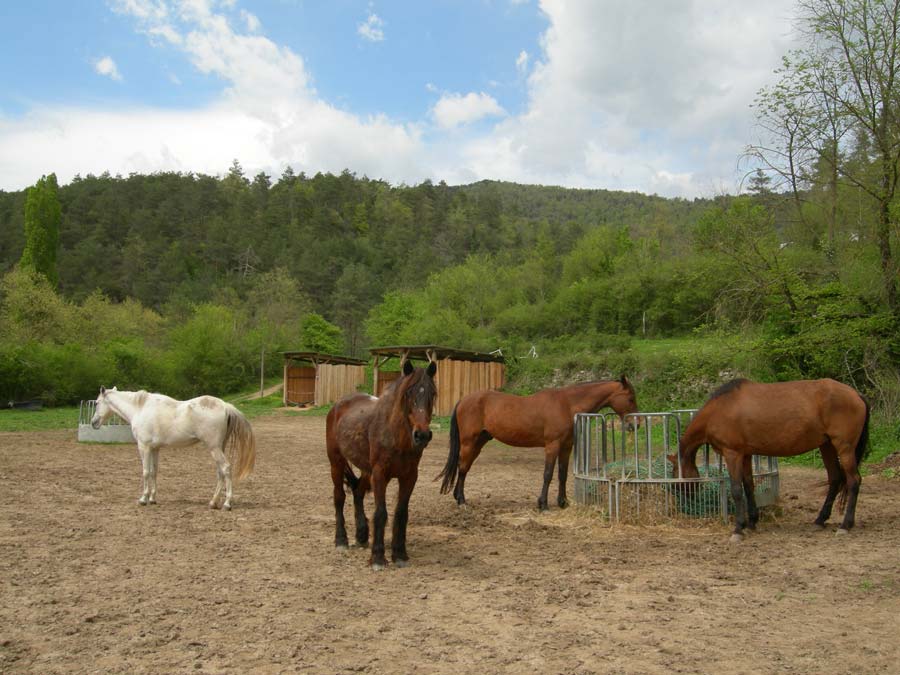
Annie Hasemanns, International Program Adviser Projeto Uerê, reports on Uerê and the situation in Brasil
Projeto Uerê 2021
Due to the corona pandemic, the public schools remained closed in 2020 and early 2021 due to the lack of vaccination of the teaching staff. Some distance learning was offered. During the first half of 2021, Projeto Uerê was able to slowly increase the number of children cared for and offer face-to-face classes. Then, in July 2021, around 35,000 residents aged 12 and older were vaccinated for the first time, and public schools called children back to school. After a year and a half without proper instruction, many children were demotivated and found it difficult to pick up the thread again. Schools in the Complexo da Maré poor district reported that 983 children and young people dropped out of school altogether. It was similar in the other favelas of Rio de Janeiro.
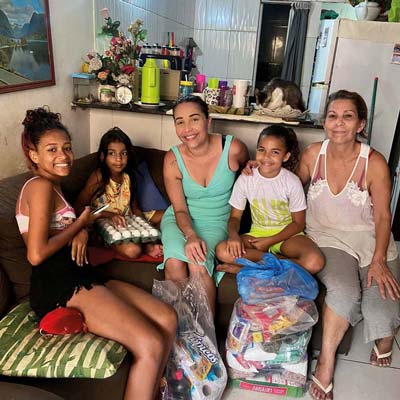
Students, like Epona Foundation-sponsored Matheus, who attend both the Uerê project and a private school, were luckier. They had partly distance and partly face-to-face lessons in 2020 and 2021 and their learning rhythm was significantly less disturbed.
As a result of the pandemic, many residents of the slum lost their informal jobs and fell back into abject poverty. Occasionally there was social assistance, but that was mostly not enough. The cityscape of Rio de Janeiro has changed in that more and more entire families are living on the streets. You were kicked out because you could no longer pay the rent for your small dwelling. This is a tragedy because these families have found themselves in such a hopeless situation through no fault of their own.
Yvonne de Mello had therefore started many campaigns in 2021 so that impoverished families in the slums at least had something to eat. Shops and restaurants put together food packages that Projeto Uerê received to distribute. Since the labor market has not yet improved significantly, many families are still dependent on help.
In the second half of 2021, the number of children in the project will be almost as high as before the pandemic. The people there were literally arguing about having their child in Projeto Uerê accommodate and sometimes showed a lack of understanding when it was not possible. The waiting list has become very long again.
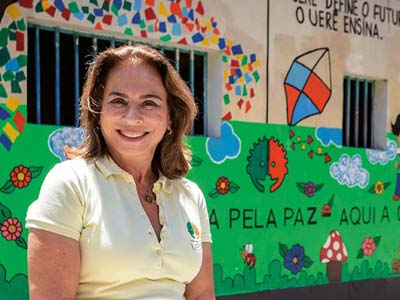
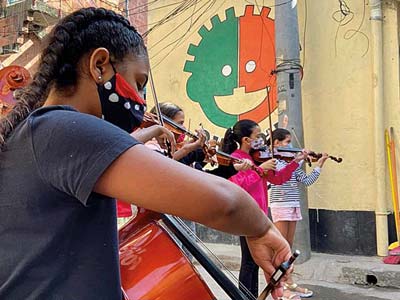
The music project in Uerê is a success with a lasting effect. A few years ago there were almost only boys who wanted to learn the violin or cello. Today almost half are girls. Even the little ones want to take part, and there is a great need for violins. It has been shown that children who play in the orchestra usually also graduate from secondary school. And that is ultimately Yvonne de Mello's goal, so that the children have a real chance on the job market and can take their place in civil society. The Uerê football team also has a permanent place in the programme. And ever since one of Uerê's former students joined Botafogo's first team, everyone has wanted to play football.
The level of violence in the slums remains high. The government plans to re-establish an increased police presence in the slums in order to prevent armed conflicts between the drug gangs. A plan that failed once before. You won't be able to win the sympathy of the local residents with weapons and uniforms - at the same time, social programs, a better infrastructure and more career opportunities are needed. It is to be hoped that they have learned from the failures of the past and will succeed this time.
